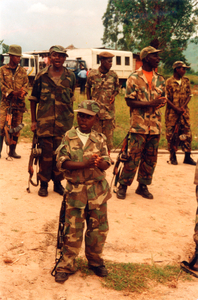
Child soldier with adults, Sanghe, Democratic Republic of Congo, June 2002.
By Angela T. Chang, Advocate, Crisis Prevention and Response Team, Amnesty International USA
When a little boy is kidnapped, turned into a child soldier, forced to kill or be killed — that’s slavery. When a little girl is sold by her impoverished family—girls my daughters’ age—runs away from home, or is lured by the false promises of a better life, and then imprisoned in a brothel and tortured if she resists — that’s slavery. It is barbaric, and it is evil, and it has no place in a civilized world.
— US President Barack Obama, September 2012
Despite these strong words by President Obama against the use and recruitment of child soldiers a few months ago, he got reprimanded earlier this week for falling flat in delivering on tangible actions to address this issue.
The UN Committee on the Rights of the Child released a new report on Tuesday, calling out the U.S. and the Obama administration for failing to adhere to its international human rights obligations by continuing to waive sanctions on military assistance, per the 2008 Child Soldiers Prevention Act, to countries that are known to recruit and use child soldiers – a clear violation of children’s rights and a war crime if the children are under the age of fifteen. Yes, you read that right. Seems confusing and backwards? That’s because it is.
